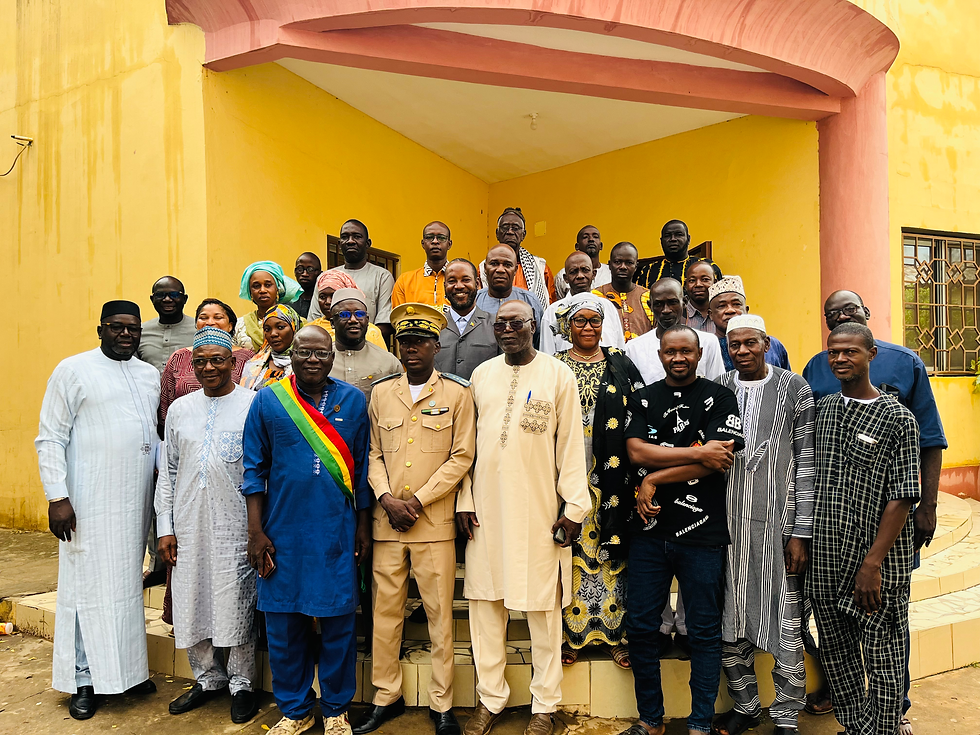Texts for Action: Advancing Local Health Governance
- Muso

- Sep 18, 2025
- 3 min read
As part of its commitment to strengthening the health system, particularly community health in Mali, Muso supported the organization of a workshop to disseminate the new regulatory texts related to community health. This workshop was held in Kayes from August 11 to 14, 2025, under the initiative of the National Federation of Community Health (FENASCOM) through the National Coalition for Strengthening Essential Community Care, in partnership with the Ministry of Health and Social Development. Muso provided both technical and financial support, actively contributing to the design, planning, and funding of the activities. The main objective of the workshop was to train and inform local actors on the new foundational texts now governing community health in Mali.

Among the documents presented were:
The Sectoral Health and Population Policy
The Health Orientation Law (Law 02-049)
The decree on the transfer of state competencies to local authorities
The Mutual Assistance Agreement (CAM)
Decree 2022-0220 establishing the conditions for the creation and operating principles of Community Health Centers (CSCOM), along with its implementing orders
The new version of the collective agreement for CSCOM staff
Organized after the sessions in Sikasso, Ségou, and Koulikoro, this fourth regional session brought together Community Health Workers (CHWs), representatives of Community Health Associations (ASACO), CSCOM staff, rural maternity centers, as well as local authorities in Kayes.
Over four days, participants from various health districts in the region discussed the challenges of implementing these texts, shared their field experiences, and strengthened their skills to promote more effective and harmonized local governance of the health system.
Concerns Raised and Responses Provided
The discussions highlighted several major concerns, including:
The unplanned construction of health centers that do not meet required standards
Difficulties in accessing care in remote areas
Challenges related to the management and operation of CSCOM
Issa Diarra, President of the ASACO of the Ouassala health area (Bafoulabé commune, Kayes), welcomed the initiative, emphasizing that the workshop enabled a better understanding of the texts governing community health and provided a platform to discuss concrete field challenges.
Representatives from the Directorate General of Local Authorities, the Directorate General of Health and Public Hygiene (DGSHP), the National Directorate of Territorial Administration, and FENASCOM addressed the concerns raised, offering clarifications and proposing practical solutions.
The participants’ feedback reflects a strong understanding of the texts. According to Dr. Boubou Kanté from DGSHP, this training will play a key role in improving the functioning of health centers.
A Key Step Toward Ownership of the Reforms
For Yaya Zan Konaré, President of FENASCOM, community health is at the heart of the national health system. According to him, this training marks a decisive turning point, providing local actors with the tools needed for effective ownership of the texts a crucial condition for their implementation in the field. He also praised Muso’s ongoing commitment, highlighting the importance of the support provided by this strategic partner, both technically and financially, as well as its active role in advocating for more inclusive public policies.
Through initiatives like this workshop, Muso reaffirms its role as a strategic partner of the Malian government in strengthening and transforming the health system. By combining technical support, funding, and advocacy efforts, Muso actively contributes to the implementation of structural reforms aimed at improving access to quality healthcare, particularly in the most remote areas. This commitment is part of a long-term vision: a health system that is more equitable, inclusive, and adapted to local realities.



Comments